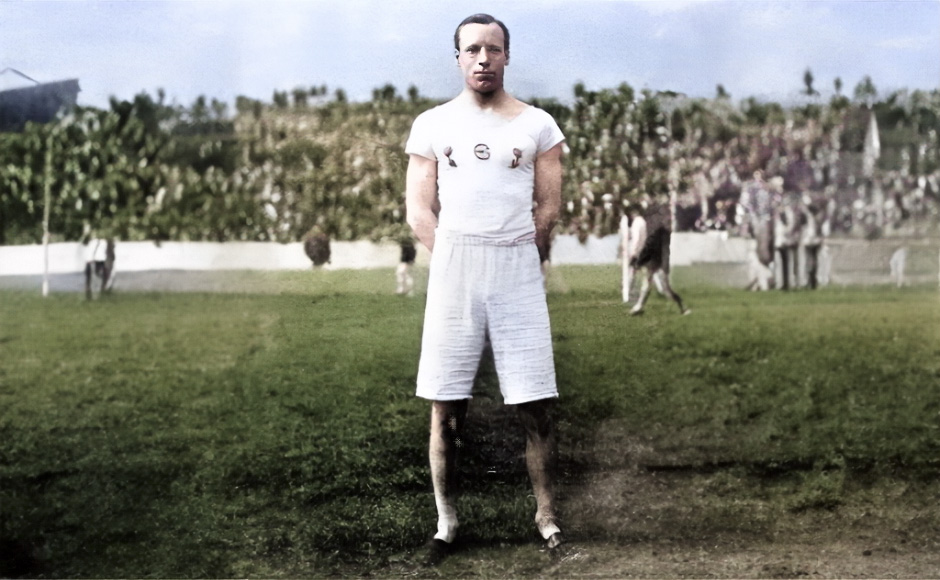Olympian's missionary legacy in China explored
The inspiring story of a legendary athlete immortalised in the film Chariots of Fire is being explored at a special event to mark the centenary of the Olympic Games in Paris.
‘The Life and Death of Eric Liddell and the Rebirth of Chinese Christianity' is being held at the Playfair Library, Old College, University of Edinburgh on 3 February.
It marks the celebration of the centenary of Liddell's famous gold medal victory in the 400m at the 1924 Olympics – the triumph depicted in the Oscar-winning 1981 film.

Organised with the cooperation of the Eric Liddell Community in Edinburgh, the free event will include contributions from three University of Edinburgh academics.
They are –
Prof Brian Stanley (Professor of World Christianity, School of Divinity), 'The Last Days of Eric Liddell and the Last Days of Mission Christianity in China'.
Dr Alex Chow (Senior Lecturer in Theology and World Christianity, School of Divinity), 'Chinese Christianity amongst the New Scots'.
Dr Mark McLeister (Lecturer in Chinese Studies, Asian Studies), 'Christianity in China Today'.
The academics will explore Mr Liddell's legacy and the subsequent history of Chinese Christianity, worldwide and in China itself.
There will also be opportunity for questions and for discussion.
Evangelist
Eric Liddell was born in 1902 in Tientsin (now Tianjin) in northern China.
His Scottish parents were Christian missionaries with the London Mission Society and he and his elder brother, Rob, went to a boarding school in London.
He saw his parents and sister when they returned to the family home in Edinburgh and in 1920 he enrolled in the University of Edinburgh to study pure science.
Known as the "Flying Scotsman", he is best remembered for refusing to compete on Sundays when the heats for the 100 metres at the 1924 Paris Olympics were held because of his belief that Sundays are set aside by God as special and not for work.
Instead he focused on the 400 metres and broke the world record three times before winning the final, which was held on a week day.
Mr Liddell graduated after the 1924 Paris Olympics. and went on to study Theology for a year after which he moved to Tientsin in northern China to work as a missionary with the London Missionary society.
He taught science at the Anglo-Chinese college and later decided to become an evangelist in rural China, travelling by foot and bicycle.
Following the Japanese invasion of China and the outbreak of the Second World War, Mr Liddell's pregnant wife and their two children left for the safety of Canada, her birth country, but he decided to stay.
He was later classified as an enemy national and sent to the prison camp at Weishien in 1943.
Mr Liddell took on a leadership role to meet prisoners' physical and spiritual needs – preaching sermons and teaching hymns.
Tragically, he developed an inoperable brain tumour and died in the camp in February 1945.
In 2015, a marble sculpture of the athlete turned missionary, captured in mid-stride, was unveiled in Tianjin and his remains lie next to it, marked by a headstone carved from Isle of Mull granite.
The Eric Liddell 100 is a programme of educational, sporting and cultural events celebrating Liddell's legacy and aiming to bring his achievements to life for new generations.
Partnerships
While the Jesuits had been present in China from the 13th century, Protestant missions there began in earnest following the Opium Wars of the 19th century.
Despite civil war and anti-foreign (and anti-Christian) uprisings such as the Boxer Rebellion (1898-1901), there were Christian missionaries present in most regions of the country.
Today, the Church of Scotland is partners with Amity Foundation and the China Christian Council and is a member of Scottish Churches China Group and Churches Together in Britain and Ireland China Forum.
In 1985 the Amity Foundation was founded as a social service with Christian motivation: in thirty years it has grown into a powerful witness to the compassion and commitment of the followers of Jesus.
It has more than 200 staff involved in range of development, education, health, environment and social activities.
Amity Foundation contributes to China's social development, raises awareness of Christian involvement in meeting the needs of society and serves as a channel for people-to-people contact and ecumenical work.
Rev Ian Alexander, who leads on international relations for the Church, said: "'Love never ends' is the motto of Amity Foundation which has done so much to share God's love in China and to share the reality of life in China to churches around the world.
"Through the work of the Amity Foundation with poor, deprived and marginalised groups, the Church of Scotland can feel part of the ongoing legacy of Eric Liddell."